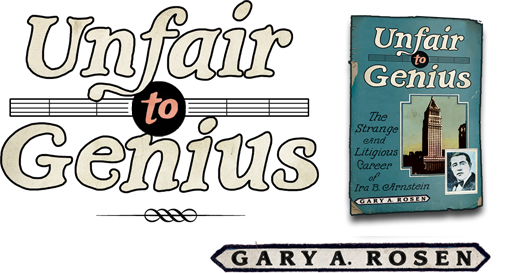

 One of the heroic archetypes in the annals of American jurisprudence is the bedraggled, unschooled litigant, armed only with a thirst for justice and a righteous determination to see it done, doing battle against entrenched and well-heeled interests, prevailing, and leaving a lasting mark in the life of the law. Ira B. Arnstein occupies a special place on the margins of that tradition. He never won a case, but over a thirty-year period he repeatedly went toe-to-toe with the popular music establishment of his day, leaving an enduring imprint merely by getting his days in court and, Rocky Balboa–like, going the distance. Even while asserting claims that strained credulity, Arnstein had a gift for posing conundrums that engaged some of the finest legal minds of his era, forcing them to refine and sharpen their doctrines.
One of the heroic archetypes in the annals of American jurisprudence is the bedraggled, unschooled litigant, armed only with a thirst for justice and a righteous determination to see it done, doing battle against entrenched and well-heeled interests, prevailing, and leaving a lasting mark in the life of the law. Ira B. Arnstein occupies a special place on the margins of that tradition. He never won a case, but over a thirty-year period he repeatedly went toe-to-toe with the popular music establishment of his day, leaving an enduring imprint merely by getting his days in court and, Rocky Balboa–like, going the distance. Even while asserting claims that strained credulity, Arnstein had a gift for posing conundrums that engaged some of the finest legal minds of his era, forcing them to refine and sharpen their doctrines.
 In his losing causes, Arnstein established legal rules that have secured a day in court for many a worthier claimant, giving fresh force to the substantive law of music copyright. The claim that Michael Bolton’s “Love Is a Wonderful Thing” infringed the Isley Brothers’ song of the same title, or the claim that George Harrison’s “My Sweet Lord” was a “subconscious” plagiarism of the Chiffons’ “He’s So Fine,” might never have gone to trial, much less resulted in multi-million dollar judgments, without the legal foundation laid by Arnstein. When Morris Albert’s treacly “Feelings” was adjudged so “strikingly similar” to Louis Gaste’s earlier “Pour Toi” as to justify an inference of deliberate copying, the court began and ended its legal analysis with reference to decades-old Arnstein precedents. When avatars of rhythm and blues, or at least their estates and distant heirs, have obtained long overdue credit and compensation for their essential contributions to rock and roll, they too owe a hat tip to their quixotic forebear, Ira B. Arnstein.
In his losing causes, Arnstein established legal rules that have secured a day in court for many a worthier claimant, giving fresh force to the substantive law of music copyright. The claim that Michael Bolton’s “Love Is a Wonderful Thing” infringed the Isley Brothers’ song of the same title, or the claim that George Harrison’s “My Sweet Lord” was a “subconscious” plagiarism of the Chiffons’ “He’s So Fine,” might never have gone to trial, much less resulted in multi-million dollar judgments, without the legal foundation laid by Arnstein. When Morris Albert’s treacly “Feelings” was adjudged so “strikingly similar” to Louis Gaste’s earlier “Pour Toi” as to justify an inference of deliberate copying, the court began and ended its legal analysis with reference to decades-old Arnstein precedents. When avatars of rhythm and blues, or at least their estates and distant heirs, have obtained long overdue credit and compensation for their essential contributions to rock and roll, they too owe a hat tip to their quixotic forebear, Ira B. Arnstein.
©2012 Gary A. Rosen